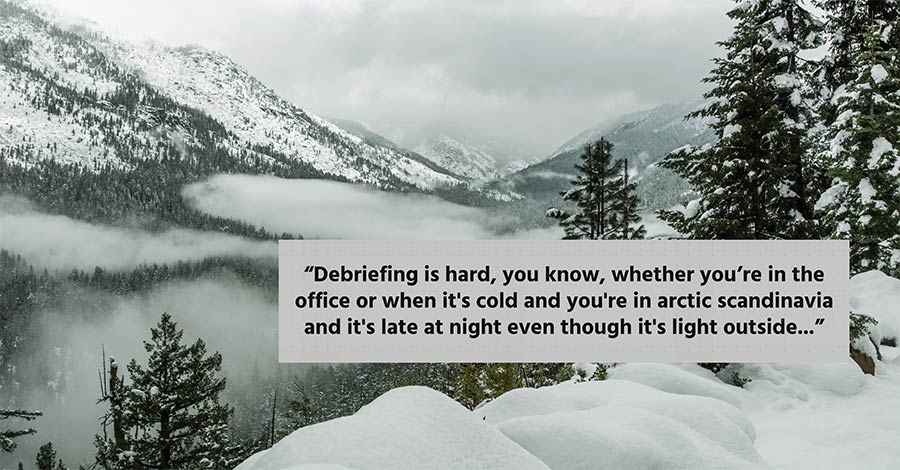Facilitation challenging to define. Even our trusty friend google is little help. Facilitation [fəˌsiləˈtāSH(ə)n/] (noun) — the action of facilitating something.
Mmmmm insightful!
When I started my journey as a facilitator I felt people were constantly whispering little (highly cryptic) facilitation secrets. Read your group. Feel the energy of the room. Open the space.
Similar to someone asking me to read, “fəˌsiləˈtāSH(ə)n/,” I had no idea what any of it meant.
In the episode of FacilitatingXYZ LIVE with Eric Boggs I heard some tangible and practical advice on two of these cryptic facilitation skills, debriefing and how to read your group. If you want to hunt for them yourself (and hear Eric makes off-handed references to the challenges of facilitating in arctic scandinavia) check out the full interview below (or here).
If not, here we go!
Debriefing
As Eric said best in our interview, “debriefing is hard!” So hard that many facilitators avoid it, especially when they start off.
Debrief tip #1—Do the debrief, right from the beginning.
“If you give your group too much hope that the debrief won’t happen… it is going to make it way harder to get them into it.”
Whether you’re facilitating a multi-day adventure or a few hour workshop, if you set the norm with the group that debriefing is simply part of the experience, you’ll be off to the races. However. If you let the first few opportunities for debriefing slide, it is going to be incredibly challenging to get folks to work with you later.
Debrief tip #2—Be actively thinking (and priming folks) for the debrief all the time.
“A lot of people think that debrief is just at the end of the day but as a facilitator my brain is always thinking about that…whether I’m on the bus and I’m asking you questions about the experience…or I notice something and then bring that back up in the debrief later, debriefing isn’t just something that happens at the end of the day.”
Good facilitation often involves calling back to something that happened or something that was said and making meaning of them in a new way. Good debriefing, similarly, can involve bringing up events early in the day or better yet reflections that you already know some participants are working on. Priming your group for debriefing throughout the experience with reflective questions and keeping in mind debriefing throughout your experience will increase the impact of that time.
How to read a group
When I started facilitating I would often ask questions like, “How should I decide when it’s time to move on from an activity?” or, “How will I know if my group trusts each other?” And all I would get back was, “Just read your group.” WELL. That. clears. up. everything. Luckily Eric has some more pro-tips.
Reading your group tip #1—Do perception checks with one person and use it to inform your understanding at large.
A perception check, as Eric explained, can be something as simple as asking someone, “So when you make *this shape* with your face is that like a confused face, thinking face, weirded out face?” And then use that information as a way to inform your understanding of that person. When you do this with enough people in a group you can use that to very specifically inform your understanding of the energy in the room.
Reading your group tip #2—Do an activity where you feel you can get a good sense of the group.
Have an activity where you know the type of emotion it is meant to insight: upbeat, reflective, energetic, and use the groups’ reaction to that activity to gauge where your group is. Did they react how you expected them to or are they in different emotional spaces? Use that information to inform your next decision.
For more nuggets of wisdom check out Eric’s full-length interview here!

